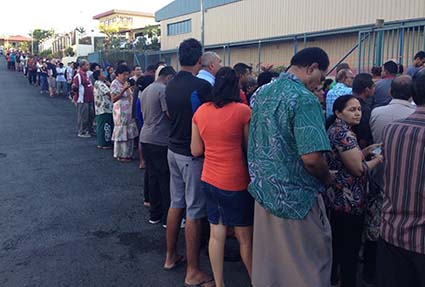
AUCKLAND (Pacific Media Watch): Media freedom in West Papua and Fiji will come under the spotlight at this month's Pacific Journalism Review 2014 conference.
The conference, from November 27 -29 at AUT University in Auckland, is being held to celebrate 20 years of publication of the Pacific Journalism Review journal.
Whether the recent Fiji election was free and fair or not is the subject of Fiji National University ethics and governance lecturer Mosmi Bihm's presentation. The elections in September took place eight years after the 2006 coup, which saw the introduction of repressive laws curtailing Freedom of Expression and the media, government accountability and the judiciary.
Bihm will discuss how, "in an atmosphere of lavish campaign advertisements on billboards, public transport vehicles and the daily media by the coup-installed Prime Minister Voreqe Bainimarama’s political party, Fiji First, political parties struggled to have their voice heard amidst the limitations".
Two daily media companies – the Fiji Broadcasting Corporation and the Fiji Sun newspaper – displayed blatant bias towards the Fiji First party, which is headed by Bainimarama and which won the election, by providing them excessive and preferential coverage and portraying other parties in a negative light. There were also harsh crackdowns by police on ‘trouble-makers’ who vandalised Fiji First posters.
Through analysing media materials, campaigning, polling and results calculations, Bihm has established if citizens were able to participate freely and fully in the 2014 ‘democratic’ elections and will reveal her findings at the conference.
Attack on academic and media freedom in Fiji
Academic Pat Craddock will also discuss the attack on academic and media freedom at the Fijian university in the months just before this year's election. Craddock and another journalism lecturer, Matthew Thompson of Australia both left the University of the South Pacific in July this year after they came into conflict with the military regime for releasing a press statement which criticised the army's defence of torture on civilians.The university then tried to compel the two academics to sign a statement acknowledging that they would obey the code of behavior expected of USP staff. The letter implied that the academics' press release was inaccurate. Craddock and Thompson denied any inaccuracy, refused to sign the letters and had to leave their jobs.
Fijian student newspaper circumvents government censorship
Assistant journalism lecturers Eliki Druganalevu and Irene Manueli will talk about how the University of the South Pacific (USP) journalism training newspaper, Wansolwara, has been able to skirt around media censorship in Fiji to report on some major national issues as part of student learning.
Both the national daily newspapers, Fiji Sun and The Fiji Times, have complied with the restrictive Media Decree, especially related to criticism of government policies, but Wansolwara refused to practise 'simulated' journalism, or "churnalism", and focused on media freedom and the impending 2014 elections this year.
Banning of foreign journalists from West Papua
Nick Chesterfield, founder of the West Papua Media Alerts news service, will speak on how to overcome "media mythmaking, malignancies, and dangerous conduct in West Papua reportage".
While media freedom in West Papua has been in the news lately, following the arrest and 14 week detention of two French journalists by the Indonesian regime, West Papua often finds itself in a media abyss. Foreign journalists are banned unless they obtain a rarely granted permit from the Indonesian government, and accept being accompanied on their stories by Idonesian intelligence officers.
According to Chesterfield, the new Indonesian president, Joko Widowi, is set to tighten the grip of Indonesian security forces on freedom of expression and the ability for independent media to operate freely in West Papua.
With only two foreign journalist permits issued to visit to West Papua in two years, West Papua Media Alerts uses its position as the only credible independent media network organisation to ‘fix’ clandestine reportage missions inside West Papua. Chesterfield will also dicuss the successes of working underground with clandestine methods and how journalists can get into West Papua.
Keynote speakers at the conference include filmmaker and political journalist Max Stahl who broke the news of the 1991 Santa Cruz massacre in Dili and who has documented the birth and evolution of his adopted nation Timor-Leste; Republika magazine chief editor Ricardo Morris of Fiji and Ces Oreña-Drilon, an award-winning Filipino television journalist once kidnapped by Abu Sayyaf rebels. She also had death threats over her investigation about the 2009 Ampatuan massacre.
This work is licensed under a Creative Commons Attribution-NonCommercial 3.0 New Zealand Licence.




